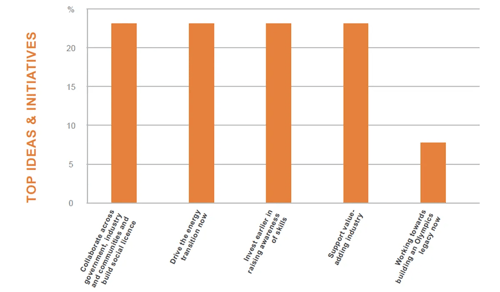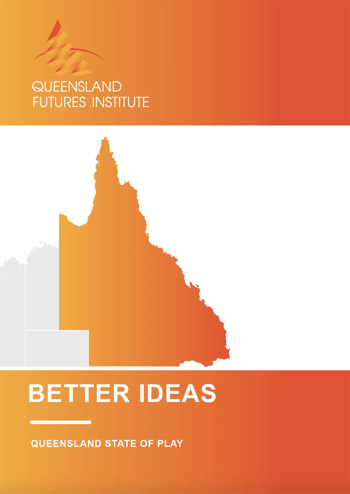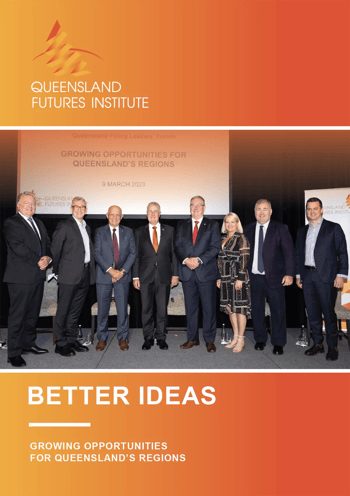BETTER IDEAS – QUEENSLAND STATE OF PLAY
The key theme from the 2023 Queensland Futures Institute’s Forum on Queensland State of Play was the breadth of opportunity and challenge in the Queensland business environment now and in the year ahead. The discussion covered the impact of macroeconomic conditions and the current high interest rate environment across all sectors, as well as the supply chain and labour challenges which businesses are facing. Addressing these headwinds requires a collaborative effort from government and industry, taking advantage of Queensland’s attractiveness for workforce and business, and leveraging trends in technology and sustainability as we move towards the 2032 Olympics. This will be critical to enable the resilience required for businesses to withstand the uncertain economic environment.
BETTER IDEAS – GROWING OPPORTUNITIES FOR QUEENSLAND’S REGIONS
The key theme from the 2023 Queensland Futures Institute Growing Opportunities for Queensland’s Regions forum was the resilience and diversity of the State’s regions and strong leadership from Local Councils to meet the accessibility, infrastructure, and social needs of their communities. Having weathered impacts of Covid, the growth of the regions must be underpinned by continued strong governance and a rethinking of the necessary funding models required to support this.
There are many opportunities for the regions over the next decade in the lead up to the Olympics, which require investment in infrastructure to allow visitors to explore our State. Sustainable growth will be key to balancing the economic benefits of this with well-planned urban development which does not come at the cost of the environment. This will likely also require collaboration across all levels of government to achieve.
BETTER IDEAS – GROWING OPPORTUNITIES FOR QUEENSLAND’S REGIONS
The key theme from the 2023 Queensland Futures Institute Growing Opportunities for Queensland’s Regions forum was the resilience and diversity of the State’s regions and strong leadership from Local Councils to meet the accessibility, infrastructure, and social needs of their communities. Having weathered impacts of Covid, the growth of the regions must be underpinned by continued strong governance and a rethinking of the necessary funding models required to support this.
There are many opportunities for the regions over the next decade in the lead up to the Olympics, which require investment in infrastructure to allow visitors to explore our State. Sustainable growth will be key to balancing the economic benefits of this with well-planned urban development which does not come at the cost of the environment. This will likely also require collaboration across all levels of government to achieve.
OUR SPEAKERS

Rebecca Andrews
State Head – Queensland, Australian Industry Group

Andrew Barger
Policy Director, Economics Queensland Resources Council

Heidi Cooper
Chief Executive Officer, Chamber of Commerce and Industry Queensland

Brett Fraser
Chief Executive Officer, Queensland Tourism and Industry Council

Jo Sheppard
Chief Executive Officer, Queensland Farmers’ Federation

Jen Williams
Queensland Executive Director, Property Council of Australia

Moderator - Associate Professor Nicole Hartley
MBA Director, UQ Business School
QFI THANKS ITS SPONSOR:

Summary from Speaker

- Queensland continues to face existing and new challenges through 2023 but retains an optimistic outlook. It remains uncertain whether we are entering a period of economic stability and security or whether economic challenges will persist.

- Queensland continues to face existing and new challenges through 2023 but retains an optimistic outlook. It remains uncertain whether we are entering a period of economic stability and security or whether economic challenges will persist.
Comments from Panel
Question 1 – Would you all provide us an overview of the year ahead for your industry and members. Also what opportunities and challenges do you foresee?

Rebecca Andrews
-
The impacts of the pandemic and invasion of Ukraine were unpredicted by the economy and we are still facing the challenges this has created.
-
The Australian Industry Group represents the broad industrial sector. We see skills and labour as a key challenge in Queensland throughout the next year.
-
In addition to this, supply chain constraints remain a challenge and although these have somewhat eased, many businesses are still experiencing difficulties; the impact of supply chain disruptions from previous years remains.
-
There is some uncertainty around the Federal Government’s industrial relations policies and agenda. The key challenge is addressing the skills and labour shortages currently being seen, particularly in the regions. To do this requires government and industry to also address the housing crisis.

Rebecca Andrews
-
The impacts of the pandemic and invasion of Ukraine were unpredicted by the economy and we are still facing the challenges this has created.
-
The Australian Industry Group represents the broad industrial sector. We see skills and labour as a key challenge in Queensland throughout the next year.
-
In addition to this, supply chain constraints remain a challenge and although these have somewhat eased, many businesses are still experiencing difficulties; the impact of supply chain disruptions from previous years remains.
-
There is some uncertainty around the Federal Government’s industrial relations policies and agenda. The key challenge is addressing the skills and labour shortages currently being seen, particularly in the regions. To do this requires government and industry to also address the housing crisis.

Cr Bob Manning OAM
-
There was a high level of uncertainty for everyone going into Covid. However, it became clear very quickly that the impacts were going to be bad. The tourism industry was quickly decimated, given we lost international visitors – 30% of the region’s total visitors – very quickly.
-
The impacts on the industry quickly took hold, and a number of companies didn’t survive the period, which was difficult for those involved in those businesses as well as the community.
-
The region was lucky to have the Crystal Brook Group come to Cairns just before Covid. The development they undertook would not have happened if they started later, and in domestic tourism which saved for the region. Having three hotels under construction at one stage meant that there was a role for Council in supporting capital works and improvements, including revamping the Esplanade and the dining precinct. This meant that by the time Covid was over, Cairns had significant drawcard assets and destinations in place to attract and serve locals and visitors.
-
Cairns therefore emerged from Covid fairly well given the great difficulties it faced early on. This came from having the drive and resilience to push through the difficulties of Covid.

Andrew Barger
-
Industry has been somewhat reactive this year given recent policy uncertainties and has not had an opportunity to lead policy development.
-
In the 12 months to December, resources generated almost 90% of Queensland’s exports by value. The resource industry supported one in six Queensland jobs and almost 25% of the Queensland economy.
-
In many ways, the economic outlook is spectacularly good; considering the market fundamentals, there are a number of opportunities, including India intending to double its steel production, strong global demand for gas, unprecedented coal prices and strong growth in metals, as companies like Tesla and BMW show high interest in the production of battery metals.
-
Queensland has the resources to take advantage of these opportunities and to help the world to decarbonise. However, we are seeing a lacklustre response in supply. The handbrake on investment is primarily policy uncertainty with notable announcements including coal royalties and gas price caps.
-
As an industry, we have to own these failures to successfully engage governments to build the case for the policy stability required to underpin long-term investment.
-
Governments and industry need to work in tandem to deliver a wholesale transition in the Queensland economy – building an ability to support resource development while also delivering a carbon positive 2032 Olympic Games.
-
Transitioning Queensland’s economy will require deep investments in transmission, batteries and renewable generation. These investments need careful planning, informed by close community engagement, because it’s the only way to deliver Queensland’s big hairy audacious targets.

Andrew Barger
-
Industry has been somewhat reactive this year given recent policy uncertainties and has not had an opportunity to lead policy development.
-
In the 12 months to December, resources generated almost 90% of Queensland’s exports by value. The resource industry supported one in six Queensland jobs and almost 25% of the Queensland economy.
-
In many ways, the economic outlook is spectacularly good; considering the market fundamentals, there are a number of opportunities, including India intending to double its steel production, strong global demand for gas, unprecedented coal prices and strong growth in metals, as companies like Tesla and BMW show high interest in the production of battery metals.
-
Queensland has the resources to take advantage of these opportunities and to help the world to decarbonise. However, we are seeing a lacklustre response in supply. The handbrake on investment is primarily policy uncertainty with notable announcements including coal royalties and gas price caps.
-
As an industry, we have to own these failures to successfully engage governments to build the case for the policy stability required to underpin long-term investment.
-
Governments and industry need to work in tandem to deliver a wholesale transition in the Queensland economy – building an ability to support resource development while also delivering a carbon positive 2032 Olympic Games.
-
Transitioning Queensland’s economy will require deep investments in transmission, batteries and renewable generation. These investments need careful planning, informed by close community engagement, because it’s the only way to deliver Queensland’s big hairy audacious targets.

Heidi Cooper
-
The Chamber of Commerce and Industry Queensland has 155 years of history in Queensland and represents businesses of every industry, of every size and in every corner of the State. The Queensland business community is best placed to unlock upcoming opportunities across the State, including the Olympics.
-
We’re looking forward to strong growth over the next decade and must ensure Queensland is the best State to do business by providing a supportive economic environment now so we can take advantage of opportunities in the future.
-
CCIQ recently released their Pulse survey of business conditions, which outlined several upcoming challenges. Businesses see attracting and retaining skilled labour and the significant increase in costs like wages, insurance, interest rates and operating costs as significant constraints on business growth. There remains uncertainty and a lack of confidence around the economy moving forward, due to macroeconomic challenges, despite recovery after the pandemic.
-
A key driver of this uncertainty is interest rates. The survey reflected this was in the top five constraints on business growth for the first time since 2010.
-
Despite these uncertainties and headwinds, we are still seeing strong performance, but must ensure adequate planning and investment activity to enable businesses to take advantage of opportunities moving forward.

Heidi Cooper
-
The Chamber of Commerce and Industry Queensland has 155 years of history in Queensland and represents businesses of every industry, of every size and in every corner of the State. The Queensland business community is best placed to unlock upcoming opportunities across the State, including the Olympics.
-
We’re looking forward to strong growth over the next decade and must ensure Queensland is the best State to do business by providing a supportive economic environment now so we can take advantage of opportunities in the future.
-
CCIQ recently released their Pulse survey of business conditions, which outlined several upcoming challenges. Businesses see attracting and retaining skilled labour and the significant increase in costs like wages, insurance, interest rates and operating costs as significant constraints on business growth. There remains uncertainty and a lack of confidence around the economy moving forward, due to macroeconomic challenges, despite recovery after the pandemic.
-
A key driver of this uncertainty is interest rates. The survey reflected this was in the top five constraints on business growth for the first time since 2010.
-
Despite these uncertainties and headwinds, we are still seeing strong performance, but must ensure adequate planning and investment activity to enable businesses to take advantage of opportunities moving forward.

Brett Fraser
- The tourism sector continues recovering to the relative strength seen in pre-pandemic levels after suffering significantly in 2020 and recovering through 2021 and 2022. The industry is still seeing the international market recover, but is showing strength domestically with Queensland the number one domestic tourism destination in the country throughout 2022, generating $25 billion to the Queensland economy, compared to $19 billion in 2019.
- Despite the strong domestic performance in 2022, a high degree of uncertainty remains around the continued growth going into 2023. It is expected that outbound tourism from Australia will increase at a faster rate than inbound international tourism returns, and this shift to outbound international travel may see a correlated reduction in domestic visitation.
- While the industry has seen an improvement over the last 3-months, workforce remains a challenge for the industry; with 4,800 advertised vacancies in the industry as at December 2022.
- In addition to this, input costs are increasing steadily, which will place increasing pressure on businesses to scale up demand to compensate for this.

Brett Fraser
- The tourism sector continues recovering to the relative strength seen in pre-pandemic levels after suffering significantly in 2020 and recovering through 2021 and 2022. The industry is still seeing the international market recover, but is showing strength domestically with Queensland the number one domestic tourism destination in the country throughout 2022, generating $25 billion to the Queensland economy, compared to $19 billion in 2019.
- Despite the strong domestic performance in 2022, a high degree of uncertainty remains around the continued growth going into 2023. It is expected that outbound tourism from Australia will increase at a faster rate than inbound international tourism returns, and this shift to outbound international travel may see a correlated reduction in domestic visitation.
- While the industry has seen an improvement over the last 3-months, workforce remains a challenge for the industry; with 4,800 advertised vacancies in the industry as at December 2022.
- In addition to this, input costs are increasing steadily, which will place increasing pressure on businesses to scale up demand to compensate for this.
Question
I have had a long involvement in the resources sector in Queensland and when the chips are down in the Queensland economy, whether it be the Global Financial Crisis or Covid, the resources sector and regions like Mackay are often the safety net that cushions the State’s finances and the economy. I am also conscious of how many people in this room are dependent on a vibrant and prosperous resources sector, the wealth creation it brings and its deep supply chains and flow-on benefits. Council’s vision is “Create opportunities to thrive”. Can you flesh that out for us and what it means for economic development in your region?

Cr Greg Williamson
- It’s an interesting concept when you look at the regions and analyse how they can contribute to the Queensland and the national economy. We’ve been underpinned by the resources sector since the mid-1970s, and the resources sector still underpins just over 50% of our regional GDP. But there’s also a couple of other contributing factors to our economy. Tourism is one, and what Covid did for us was increase our tourism return to the regional economy, now valued at about $740 million just from domestic tourism.
- The other area is agriculture, which will deliver high value diversification for our economy in the future. Over the last 12 months, we have had discussions with CSIRO’s private enterprise company ‘Main Sequence’ and a number of potential investors from around the world to use sugar as the bio content for the future.
- We grow about a third of Australia’s sugar and in our valley, we have about 200,000 hectares of good quality agricultural land. Currently, 100,000 of that is dedicated to the growing of sugar cane, so there is potential to grow the industry.
- The biofuture is more than a buzzword – given scientists predict we won’t be able to feed the world’s population in 2050, we have to produce protein for the world – and sugar can do that.
- Sugar molecules – fructose and glucose – are much higher in carbon content than corn syrup. It is possible to bio-brew milk out of the carbon content of sugar. This bio-brewed product has great potential. If we can get this right for Queensland Biofutures, using sugar to produce milk, and egg white too, which is the most in demand protein in the world, this opportunity will be bigger than coal for Queensland.
- So that’s the diversification that we are focusing on because we really believe we can as a state make a mark in biofutures to supply feedstock and protein to the world.

Jo Sheppard
-
The agriculture industry is seeing opportunities and challenges in line with other sectors.
-
The Queensland Farmers Federation is Queensland’s representative body for agriculture, whose members are peak bodies, representing over 13,000 farmers across Queensland.
-
The industry has seen strong commodity prices and global demand coming off the back of a couple of years of good production seasons. There are enormous growth opportunities arising across the State but also critical challenges which must be addressed, including increasing input costs like fuel and fertiliser, which has seen an increase of over 120% in the last two or three years.
-
The workforce challenges have escalated from being a shortage to a crisis, with farmers consistently understaffed and over-worked. For example, we have seen farmers decide against planting crops as they have no confidence that they have the manpower to harvest.
-
The State has also seen significant flooding events which have adversely impacted farmers’ livelihoods, as well as ongoing supply chain disruptions, which are becoming commonplace as farmer’s learn to manage them and consumers come to expect them.
-
The sector is equipped to deal with the significant changes we’re currently seeing, given farmers’ ability to respond and be resilient in order to take advantage of opportunities and succeed.

Jo Sheppard
-
The agriculture industry is seeing opportunities and challenges in line with other sectors.
-
The Queensland Farmers Federation is Queensland’s representative body for agriculture, whose members are peak bodies, representing over 13,000 farmers across Queensland.
-
The industry has seen strong commodity prices and global demand coming off the back of a couple of years of good production seasons. There are enormous growth opportunities arising across the State but also critical challenges which must be addressed, including increasing input costs like fuel and fertiliser, which has seen an increase of over 120% in the last two or three years.
-
The workforce challenges have escalated from being a shortage to a crisis, with farmers consistently understaffed and over-worked. For example, we have seen farmers decide against planting crops as they have no confidence that they have the manpower to harvest.
-
The State has also seen significant flooding events which have adversely impacted farmers’ livelihoods, as well as ongoing supply chain disruptions, which are becoming commonplace as farmer’s learn to manage them and consumers come to expect them.
-
The sector is equipped to deal with the significant changes we’re currently seeing, given farmers’ ability to respond and be resilient in order to take advantage of opportunities and succeed.

Jen Williams
-
Similarly to other sectors, the property industry is dealing with a high level of skills and labour uncertainty. However, Queensland is well placed compared to other states given strong interstate migration. But this is also creating challenges in meeting demand and contributing to the housing crisis.
-
Given current interest rates and construction costs, there is insufficient investment in supply and we are seeing less supply relative to demand than ever before.
-
Similarly, the commercial sector is strong; recent data on the office market recently released showed four times the historical average of take up of leasing space in the CBD for the second reporting period in a row. This would be equivalent to the 80 Ann Street building. This strong demand is largely comprised of small to medium businesses, reflecting strong SME growth and start-up activity. These trends show strength in the Queensland economy.
-
The industrial sector has also experienced strong demand throughout the pandemic as logistics businesses grew. In the current economic environment, while retail is doing well now, we may see activity slow.
-
Public private partnerships and collaboration between industry and government will likely be a strong driver in the near future. For example, we are seeing the biggest Queensland Government health spend, driving social infrastructure which will likely contribute to the above trends.

Jen Williams
-
Similarly to other sectors, the property industry is dealing with a high level of skills and labour uncertainty. However, Queensland is well placed compared to other states given strong interstate migration. But this is also creating challenges in meeting demand and contributing to the housing crisis.
-
Given current interest rates and construction costs, there is insufficient investment in supply and we are seeing less supply relative to demand than ever before.
-
Similarly, the commercial sector is strong; recent data on the office market recently released showed four times the historical average of take up of leasing space in the CBD for the second reporting period in a row. This would be equivalent to the 80 Ann Street building. This strong demand is largely comprised of small to medium businesses, reflecting strong SME growth and start-up activity. These trends show strength in the Queensland economy.
-
The industrial sector has also experienced strong demand throughout the pandemic as logistics businesses grew. In the current economic environment, while retail is doing well now, we may see activity slow.
-
Public private partnerships and collaboration between industry and government will likely be a strong driver in the near future. For example, we are seeing the biggest Queensland Government health spend, driving social infrastructure which will likely contribute to the above trends.
Question 2 – All sectors of the Queensland economy are facing shared challenges but also a number of growth opportunities in the near future. Given the
macroeconomic challenges already discussed, how can industry remain resilient through this uncertainty?
Question 2 – All sectors of the Queensland economy are facing shared challenges but also a number of growth opportunities in the near future. Given the
macroeconomic challenges already discussed, how can industry remain resilient through this uncertainty?

Andrew Barger
-
When the resources industry finds itself in a hole, it tends to keep digging. Given the high levels of uncertainty and volatility, it is important to focus on what can be managed. For example, managing expectations around the current period of high prices is critical so that the industry remains competitive if and when prices normalise. This strict price discipline is particularly important as the industry works through supply chain disruptions and with communities as the economy recovers.
-
Focusing on what is manageable is also critical in addressing the skills crisis. Due to the current environment, the industry can no longer rely on poaching talent and attracting workforce through remuneration given the current tight supply of workforce available. There has therefore been a strong increase in training programs, apprenticeships and scholarships to grow the workforce rather than attract workers from elsewhere, given the structural blockages restricting the industry’s ability to do so.

Andrew Barger
-
When the resources industry finds itself in a hole, it tends to keep digging. Given the high levels of uncertainty and volatility, it is important to focus on what can be managed. For example, managing expectations around the current period of high prices is critical so that the industry remains competitive if and when prices normalise. This strict price discipline is particularly important as the industry works through supply chain disruptions and with communities as the economy recovers.
-
Focusing on what is manageable is also critical in addressing the skills crisis. Due to the current environment, the industry can no longer rely on poaching talent and attracting workforce through remuneration given the current tight supply of workforce available. There has therefore been a strong increase in training programs, apprenticeships and scholarships to grow the workforce rather than attract workers from elsewhere, given the structural blockages restricting the industry’s ability to do so.

Heidi Cooper
-
Pulse data usually shows business sentiment and confidence rise alongside performance. However, we have recently seen a decoupling of this over the last two quarters. Although performance has returned to pre-pandemic levels, confidence in the future of the state and national economies is weak due to the challenges and uncertainty which still lie ahead, including the macroeconomic, workforce, supply chain and input cost issues already discussed.
-
It is critical to ensure businesses are confident with the economic outlook in the next 12 months, and support the required investment needed to grow the economy and further build in resilience.
-
A study CCIQ recently conducted with support of Australian Retirement Trust considered the future of work in order to support businesses now and in the future. Workforce and the attraction and retention of labour will continue being a critical issue moving forward. As discussed above, businesses are becoming more resilient to this as they consider how to best retain their workforces, given the attraction component is so difficult in the current environment. This is resulting in businesses thinking about jobs differently and innovating around the ways we work.

Heidi Cooper
-
Pulse data usually shows business sentiment and confidence rise alongside performance. However, we have recently seen a decoupling of this over the last two quarters. Although performance has returned to pre-pandemic levels, confidence in the future of the state and national economies is weak due to the challenges and uncertainty which still lie ahead, including the macroeconomic, workforce, supply chain and input cost issues already discussed.
-
It is critical to ensure businesses are confident with the economic outlook in the next 12 months, and support the required investment needed to grow the economy and further build in resilience.
-
A study CCIQ recently conducted with support of Australian Retirement Trust considered the future of work in order to support businesses now and in the future. Workforce and the attraction and retention of labour will continue being a critical issue moving forward. As discussed above, businesses are becoming more resilient to this as they consider how to best retain their workforces, given the attraction component is so difficult in the current environment. This is resulting in businesses thinking about jobs differently and innovating around the ways we work.
Question 3 – What are the significant game changers which will be seen by industry in the next year?
Question 3 – What are the significant game changers which will be seen by industry in the next year?

Jo Sheppard
-
The workforce shortage continues to be a key challenge for Queensland agriculture, and we are seeing farming enterprises and businesses across the supply chain trying to work in different ways to address this. QFF has been working with its members to develop a digital platform called Ag Jobs Queensland, which will soon be launched at Parliament House and will help to increase participation in the agriculture sector. Ag Jobs Queensland is a sophisticated job matching tool but also a terrific vehicle where we can showcase and promote the incredible careers and job opportunities that are available in agriculture. A key challenge for the sector is increasing the awareness of the careers in agriculture, so Ag Jobs Queensland aims to showcase these career opportunities and connect employers with employees in doing so.
-
The real gamechanger for the industry will be around how successful we can be in creating our own future in the sustainability space. Farmers are important land managers and are key stakeholders as we work to achieve environmental outcomes but also increased productivity and stronger regional communities. We need government, industry and communities to work really closely together to improve productivity and achieve positive regional development and environmental outcomes. We cannot achieve one without the other. We must focus on the big picture. Given the impacts of changing climate conditions on agricultural production, this will likely impact food supply and ultimately cost of food and living. Therefore, it is critical to make sure agriculture has a seat at the table on every discussion regarding sustainability if we are to ensure adequate supply, whilst supporting regional communities over the next decade.
-
In order to achieve the desired environmental outcomes, we need to support farmers and provide them a seat at the table. Farmers manage over three quarters of the land mass in Queensland, so are a key stakeholder in this discussion.

Jo Sheppard
-
The workforce shortage continues to be a key challenge for Queensland agriculture, and we are seeing farming enterprises and businesses across the supply chain trying to work in different ways to address this. QFF has been working with its members to develop a digital platform called Ag Jobs Queensland, which will soon be launched at Parliament House and will help to increase participation in the agriculture sector. Ag Jobs Queensland is a sophisticated job matching tool but also a terrific vehicle where we can showcase and promote the incredible careers and job opportunities that are available in agriculture. A key challenge for the sector is increasing the awareness of the careers in agriculture, so Ag Jobs Queensland aims to showcase these career opportunities and connect employers with employees in doing so.
-
The real gamechanger for the industry will be around how successful we can be in creating our own future in the sustainability space. Farmers are important land managers and are key stakeholders as we work to achieve environmental outcomes but also increased productivity and stronger regional communities. We need government, industry and communities to work really closely together to improve productivity and achieve positive regional development and environmental outcomes. We cannot achieve one without the other. We must focus on the big picture. Given the impacts of changing climate conditions on agricultural production, this will likely impact food supply and ultimately cost of food and living. Therefore, it is critical to make sure agriculture has a seat at the table on every discussion regarding sustainability if we are to ensure adequate supply, whilst supporting regional communities over the next decade.
-
In order to achieve the desired environmental outcomes, we need to support farmers and provide them a seat at the table. Farmers manage over three quarters of the land mass in Queensland, so are a key stakeholder in this discussion.

Rebecca Andrews
-
We have seen strong adoption of technology, particularly since the pandemic, across all sectors including industrials, manufacturing, defence, construction and mining. This has supported businesses in addressing supply chain and workforce challenges and allowed products to reachthe market faster. Given the current conditions and tight margins, the adoption of technology is also important in supporting efficiencies and cost reductions.
-
The energy transition will also drive significant changes as businesses decarbonise. As industries shift, we will require flexibility in adapting to what businesses come to look like and meet the requirements needed to achieve this. This includes both flexibility in businesses but also in the workforce, as jobs change, and the training and education required also shifts to meet this demand.
-
Shifts in perception will also be important to support the transition of industry. This must be achieved from changing the approach to early education and highlighting the opportunities across sectors. For example, we should continue to promote young girls in STEM and enable the next generation to adapt to this changing environment.
-
Businesses must not be afraid of these shifts, particularly around the adoption of technology, and need to seek advice and support from the industry to enable this transition to occur smoothly. For example, we must think about the future challenges that will arise as we take advantage of technology, such as around cybersecurity.

Rebecca Andrews
-
We have seen strong adoption of technology, particularly since the pandemic, across all sectors including industrials, manufacturing, defence, construction and mining. This has supported businesses in addressing supply chain and workforce challenges and allowed products to reachthe market faster. Given the current conditions and tight margins, the adoption of technology is also important in supporting efficiencies and cost reductions.
-
The energy transition will also drive significant changes as businesses decarbonise. As industries shift, we will require flexibility in adapting to what businesses come to look like and meet the requirements needed to achieve this. This includes both flexibility in businesses but also in the workforce, as jobs change, and the training and education required also shifts to meet this demand.
-
Shifts in perception will also be important to support the transition of industry. This must be achieved from changing the approach to early education and highlighting the opportunities across sectors. For example, we should continue to promote young girls in STEM and enable the next generation to adapt to this changing environment.
-
Businesses must not be afraid of these shifts, particularly around the adoption of technology, and need to seek advice and support from the industry to enable this transition to occur smoothly. For example, we must think about the future challenges that will arise as we take advantage of technology, such as around cybersecurity.

Jen Williams
-
The current macroeconomic and interest rate environment will have massive implications for industry over the coming twelve months. The industry will benefit once interest rates stabilise, which its expected may come in August. Until then, activity may remain low due to the associated high costs of financing.
-
The 2032 Olympics and Paralympics will fundamentally change Queensland, and we must now decide on what impact we want to have. This will invest in and work towards a climate positive Games, which will drive sustainability and ensure it remains at the core of economic activity until 2032. For example, strengthening the electric vehicle sector will be a key outcome of this.
-
The Olympics will also drive diversity in immigration, visitors and workforce and encourage new businesses and industries.

Jen Williams
-
The current macroeconomic and interest rate environment will have massive implications for industry over the coming twelve months. The industry will benefit once interest rates stabilise, which its expected may come in August. Until then, activity may remain low due to the associated high costs of financing.
-
The 2032 Olympics and Paralympics will fundamentally change Queensland, and we must now decide on what impact we want to have. This will invest in and work towards a climate positive Games, which will drive sustainability and ensure it remains at the core of economic activity until 2032. For example, strengthening the electric vehicle sector will be a key outcome of this.
-
The Olympics will also drive diversity in immigration, visitors and workforce and encourage new businesses and industries.
Question 4 – How has technology created opportunities or brought disruptors to the industry?
Question 4 – How has technology created opportunities or brought disruptors to the industry?

Brett Fraser
-
There are many different technologies and innovations driving digitisation. Data is a critical part of this and allows the industry to have better insights into the uncertain future discussed above. Leveraging data increases predictability, moving the industry from relying on past performance to inform growth trajectory, to real-time data which provides much stronger insights. For example, work is currently being undertaken by MasterCard and Visa to provide businesses with better access to data, allowing them better understanding of their current position and what they need to do to take advantage of current market demand and grow their business.
-
Nine out of ten tourism businesses are small businesses, of which there are approximately 60,000 in the industry across Queensland. These businesses rely on these types of technologies to grow, as they don’t have the vast amounts of investment in technology that big companies have.
-
Technology is also enabling significant advances in experiential tourism. For example, Augmented and Virtual Reality could be used at The Age of Dinosaurs in Winton to overlay the dinosaur stampede on the footprints that currently exist. This technology is another example of a game changer which will support new and exciting tourism opportunities.
-
On the supply side, the aviation sector is critical to meeting sustainability targets and continue bringing tourists into the State. Reaching Net Zero will be a challenge for the aviation industry but can be achieved through innovation in sustainable aviation fuels. New routes, such as the recently announced Virgin flight from Cairns to Japan are taking advantage of the latest generation of aircraft, which make these routes feasible, opening new markets.
-
One of the key challenges for the industry will be ensuring that small businesses benefit from these developments.

Brett Fraser
-
There are many different technologies and innovations driving digitisation. Data is a critical part of this and allows the industry to have better insights into the uncertain future discussed above. Leveraging data increases predictability, moving the industry from relying on past performance to inform growth trajectory, to real-time data which provides much stronger insights. For example, work is currently being undertaken by MasterCard and Visa to provide businesses with better access to data, allowing them better understanding of their current position and what they need to do to take advantage of current market demand and grow their business.
-
Nine out of ten tourism businesses are small businesses, of which there are approximately 60,000 in the industry across Queensland. These businesses rely on these types of technologies to grow, as they don’t have the vast amounts of investment in technology that big companies have.
-
Technology is also enabling significant advances in experiential tourism. For example, Augmented and Virtual Reality could be used at The Age of Dinosaurs in Winton to overlay the dinosaur stampede on the footprints that currently exist. This technology is another example of a game changer which will support new and exciting tourism opportunities.
-
On the supply side, the aviation sector is critical to meeting sustainability targets and continue bringing tourists into the State. Reaching Net Zero will be a challenge for the aviation industry but can be achieved through innovation in sustainable aviation fuels. New routes, such as the recently announced Virgin flight from Cairns to Japan are taking advantage of the latest generation of aircraft, which make these routes feasible, opening new markets.
-
One of the key challenges for the industry will be ensuring that small businesses benefit from these developments.

Jen Williams
-
Queensland has a strong PropTech space, supporting a large percentage of Australia’s PropTech companies locally. Connecting businesses and communities within the property industry is therefore critical to creating opportunities and boosting the capabilities of the industry.

Jen Williams
-
Queensland has a strong PropTech space, supporting a large percentage of Australia’s PropTech companies locally. Connecting businesses and communities within the property industry is therefore critical to creating opportunities and boosting the capabilities of the industry.
Audience Questions
Question 1 – Yesterday saw the announcement of the Path to Treaty legislation. How can business and business leaders engage in this process and support its outcomes?
Question 1 – Yesterday saw the announcement of the Path to Treaty legislation. How can business and business leaders engage in this process and support its outcomes?
Question 1 – Yesterday saw the announcement of the Path to Treaty legislation. How can business and business leaders engage in this process and support its outcomes?

Jen Williams
-
The context of the Voice is very important in industry and the outcomes of this are still being considered. The Property Council will work through the positive impacts this will have for its members and industry soon, once this legislation is able to be reviewed.

Jen Williams
-
The context of the Voice is very important in industry and the outcomes of this are still being considered. The Property Council will work through the positive impacts this will have for its members and industry soon, once this legislation is able to be reviewed.

Rebecca Andrews
-
Yesterday’s event was positive and saw high levels of engagement in the room. Once the legislation can be reviewed, it will be clear how industry can contribute.

Rebecca Andrews
-
Yesterday’s event was positive and saw high levels of engagement in the room. Once the legislation can be reviewed, it will be clear how industry can contribute.

Andrew Barger
-
Queensland Resources Council was involved in the consultation process which reflected a genuine commitment to exploring a diversity of views. It will be difficult for government to work through this given the complexity of views. This extends to the role of peak bodies, industry associations and businesses in working through the impact of this legislation. In the resources industry, these conversations occur at a site level alongside highly localised discussions with Native Title parties and Traditional Owners to allow greater understanding of the local nuance.
-
This announcement is a positive step in the right direction from the government.

Andrew Barger
-
Queensland Resources Council was involved in the consultation process which reflected a genuine commitment to exploring a diversity of views. It will be difficult for government to work through this given the complexity of views. This extends to the role of peak bodies, industry associations and businesses in working through the impact of this legislation. In the resources industry, these conversations occur at a site level alongside highly localised discussions with Native Title parties and Traditional Owners to allow greater understanding of the local nuance.
-
This announcement is a positive step in the right direction from the government.

Brett Fraser
-
Every person who visits our State is visiting traditional lands. It is particularly important to recognise this in the tourism industry, given we are hosting people on country.
-
Yesterday’s event was an important step within the journey.
-
QTIC has been leading a journey for over a decade within the tourism industry, and have been working hand in hand together with First Nations groups, non-indigenous businesses and First Nations businesses in Queensland.
-
The tourism industry will have a significant opportunity to make substantive change and therefore will play an important role in the journey.

Brett Fraser
-
Every person who visits our State is visiting traditional lands. It is particularly important to recognise this in the tourism industry, given we are hosting people on country.
-
Yesterday’s event was an important step within the journey.
-
QTIC has been leading a journey for over a decade within the tourism industry, and have been working hand in hand together with First Nations groups, non-indigenous businesses and First Nations businesses in Queensland.
-
The tourism industry will have a significant opportunity to make substantive change and therefore will play an important role in the journey.
Question 2 – Given the dilemma between labour and housing shortages, how do we support communities in understanding the benefits of development to support the increasing population needed to meet workforce demand?
Question 2 – Given the dilemma between labour and housing shortages, how do we support communities in understanding the benefits of development to support the increasing population needed to meet workforce demand?

Heidi Cooper
-
Industry is currently working through the interconnectivity of these issues; businesses cannot employ workers if they don’t have somewhere to live. The only way this will be solved is working collectively to resolve these challenges. Similarly, sustainability forms one of the top five priorities going forward for the business community. Sustainable business practices are a priority as businesses try to solve current day challenges and remain competitive into the future.
-
Businesses may address workforce difficulties through improved retention and sustainability practices, which are demanded across markets and from customers. Business sustainability can also support access to capital, as banks and investors increasingly value sustainability. These issues are interconnected and require collaborative effort to solve and ensure businesses remain competitive into the future.

Heidi Cooper
-
Industry is currently working through the interconnectivity of these issues; businesses cannot employ workers if they don’t have somewhere to live. The only way this will be solved is working collectively to resolve these challenges. Similarly, sustainability forms one of the top five priorities going forward for the business community. Sustainable business practices are a priority as businesses try to solve current day challenges and remain competitive into the future.
-
Businesses may address workforce difficulties through improved retention and sustainability practices, which are demanded across markets and from customers. Business sustainability can also support access to capital, as banks and investors increasingly value sustainability. These issues are interconnected and require collaborative effort to solve and ensure businesses remain competitive into the future.

Rebecca Andrews
-
We need better planning and to change our thinking about how we are supporting communities. We need to think differently if we are to address this dilemma. For example, projects undertaken in regional areas, such as temporary camps, accommodation or social housing, have strong impact across multiple areas for both businesses and the community. We need to continue to develop new and innovative solutions such as these. The Housing Summit is a great opportunity to do this.
-
A recent survey found that CEOs consider they are investing more in skills and labour now than they have in the last ten years, and that this investment is being drawn from what would otherwise contribute to R&D. This is troubling as it may stymie innovation in the future. However, this is necessary given the need to retain talent given the current conditions.

Rebecca Andrews
-
We need better planning and to change our thinking about how we are supporting communities. We need to think differently if we are to address this dilemma. For example, projects undertaken in regional areas, such as temporary camps, accommodation or social housing, have strong impact across multiple areas for both businesses and the community. We need to continue to develop new and innovative solutions such as these. The Housing Summit is a great opportunity to do this.
-
A recent survey found that CEOs consider they are investing more in skills and labour now than they have in the last ten years, and that this investment is being drawn from what would otherwise contribute to R&D. This is troubling as it may stymie innovation in the future. However, this is necessary given the need to retain talent given the current conditions.

Jo Sheppard
-
The interconnectedness of issues we have been discussing is important to understand, and the recent global renewables announcements serve as a reminder that we are competing globally for workforce and for materials in relation to the renewable race, but also more generally across all aspects of industry. We need to continue to leverage our attractiveness and liveability to attract talent and be ahead of the game when it comes to investment attraction.
-
Regional planning is a useful vehicle that we can address this issue through. Competing land use and regional planning will have an impact on how communities are able to plan for the future. Localised and place based engagement is therefore key to the state planning undertaken to address these issues.

Jo Sheppard
-
The interconnectedness of issues we have been discussing is important to understand, and the recent global renewables announcements serve as a reminder that we are competing globally for workforce and for materials in relation to the renewable race, but also more generally across all aspects of industry. We need to continue to leverage our attractiveness and liveability to attract talent and be ahead of the game when it comes to investment attraction.
-
Regional planning is a useful vehicle that we can address this issue through. Competing land use and regional planning will have an impact on how communities are able to plan for the future. Localised and place based engagement is therefore key to the state planning undertaken to address these issues.

Jen Williams
-
A recent announcement that the housing investment fund will be expanded to support more affordable housing highlights the work which needs to be done before we keep attracting new people to Queensland. Social infrastructure such as hospitals and schools cannot be delivered fast enough to keep up with the demand for bringing in new talent and continued migration. Queenslanders recognise this and appreciate their suburbs, reasonable commute and vast space, and do not automatically recognise the need for development to support an increased population. We therefore need to win people’s hearts and minds, highlighting the negative impacts such as poverty and homelessness if we do not develop the needed housing and infrastructure for this growth.
-
The Housing Summit did this well and brought together different perspectives of this issue. For example, showing that social housing is not detrimental to areas can reduce communities’ fear around growth.
-
The Olympics and the Paralympics can also be used to persuade the hearts and minds of Queenslanders. Similarly to how London’s Olympics legacy was extending the life expectancy of the people in their East End, we can leverage this opportunity to address this critical issue for our State.

Jen Williams
-
A recent announcement that the housing investment fund will be expanded to support more affordable housing highlights the work which needs to be done before we keep attracting new people to Queensland. Social infrastructure such as hospitals and schools cannot be delivered fast enough to keep up with the demand for bringing in new talent and continued migration. Queenslanders recognise this and appreciate their suburbs, reasonable commute and vast space, and do not automatically recognise the need for development to support an increased population. We therefore need to win people’s hearts and minds, highlighting the negative impacts such as poverty and homelessness if we do not develop the needed housing and infrastructure for this growth.
-
The Housing Summit did this well and brought together different perspectives of this issue. For example, showing that social housing is not detrimental to areas can reduce communities’ fear around growth.
-
The Olympics and the Paralympics can also be used to persuade the hearts and minds of Queenslanders. Similarly to how London’s Olympics legacy was extending the life expectancy of the people in their East End, we can leverage this opportunity to address this critical issue for our State.
What’s one thing industry can do this year to work towards addressing
the problems discussed today?
What’s one thing industry can do this year to work towards addressing
the problems discussed today?

Rebecca Andrews
-
We should take advantage of the opportunity to consider what legacy we want to build with the Olympics, which should be focused on achieving social outcomes such as reducing domestic violence. As we start to build the physical infrastructure, Brisbane and Queensland can become a world leader in development of the social infrastructure and challenges we are facing today to deliver a safe, and sustainable place for all people.

Rebecca Andrews
-
We should take advantage of the opportunity to consider what legacy we want to build with the Olympics, which should be focused on achieving social outcomes such as reducing domestic violence. As we start to build the physical infrastructure, Brisbane and Queensland can become a world leader in development of the social infrastructure and challenges we are facing today to deliver a safe, and sustainable place for all people.

Jo Sheppard
-
In agriculture and for the economy and community more broadly, we have to get the energy transition right, and need to get the planning right to do so. In the next five to ten years, we need to provide affordable, reliable energy for all Queenslanders. This will involve planning and close collaboration with industry to achieve. If we get it right, we can deliver a sustainable future for the grid, and bring many strategic opportunities such as off-grid developments for agriculture and communities. This will underpin economic stability going forward, and ensure we get planning and social license right so that we bring all communities, particularly the regions, together.

Jo Sheppard
-
In agriculture and for the economy and community more broadly, we have to get the energy transition right, and need to get the planning right to do so. In the next five to ten years, we need to provide affordable, reliable energy for all Queenslanders. This will involve planning and close collaboration with industry to achieve. If we get it right, we can deliver a sustainable future for the grid, and bring many strategic opportunities such as off-grid developments for agriculture and communities. This will underpin economic stability going forward, and ensure we get planning and social license right so that we bring all communities, particularly the regions, together.

Andrew Barger
-
The energy transition must be the focus now if we are to deliver the outcomes we need in time. This will happen so fast that there is little room to make mistakes around planning and delivery of critical projects. As we move into new economy minerals and see an increase in local processing and value-adding, we need to adapt to meet a scale of change we have not seen before.
-
The scale of this development will be seen through the delivery of new pumped hydro projects which will be a massive undertaking and have a lasting impact on regional communities. We need to ensure that these communities understand the economic and environmental benefits delivered by investing in projects such as this, as well as their contribution to an affordable, reliable electricity system. Once this occurs, it will unlock further value-adding capability to the Queensland economy, and establish a positive cycle of development.

Andrew Barger
-
The energy transition must be the focus now if we are to deliver the outcomes we need in time. This will happen so fast that there is little room to make mistakes around planning and delivery of critical projects. As we move into new economy minerals and see an increase in local processing and value-adding, we need to adapt to meet a scale of change we have not seen before.
-
The scale of this development will be seen through the delivery of new pumped hydro projects which will be a massive undertaking and have a lasting impact on regional communities. We need to ensure that these communities understand the economic and environmental benefits delivered by investing in projects such as this, as well as their contribution to an affordable, reliable electricity system. Once this occurs, it will unlock further value-adding capability to the Queensland economy, and establish a positive cycle of development.

Heidi Cooper
-
There is extraordinary opportunity over the next decade and for businesses across the State and across industries. This requires us to plan and invest now in order to facilitate these benefits over the next 10 years and beyond. This includes making the right decisions between government and businesses today to support businesses as the lifeblood of our economy and to deliver benefits across communities tomorrow.

Heidi Cooper
-
There is extraordinary opportunity over the next decade and for businesses across the State and across industries. This requires us to plan and invest now in order to facilitate these benefits over the next 10 years and beyond. This includes making the right decisions between government and businesses today to support businesses as the lifeblood of our economy and to deliver benefits across communities tomorrow.

Jen Williams
-
We need political leadership now in order to deliver the development already discussed which is needed over the next decade. For example, to implement the outcomes which came out of the Housing Summit report, government needs to work collaboratively with businesses and the community.

Jen Williams
-
We need political leadership now in order to deliver the development already discussed which is needed over the next decade. For example, to implement the outcomes which came out of the Housing Summit report, government needs to work collaboratively with businesses and the community.

Brett Fraser
-
In line with the above discussion, we need to make the most of the incredible opportunities that we have in the lead up to the 2032 Olympics and Paralympics. This requires us to act now and think strategically about the investments that will benefit Queensland for the next two decades and beyond.

Brett Fraser
-
In line with the above discussion, we need to make the most of the incredible opportunities that we have in the lead up to the 2032 Olympics and Paralympics. This requires us to act now and think strategically about the investments that will benefit Queensland for the next two decades and beyond.
Summary of Comments

- The uncertainty and size of the problems being faced across Queensland, including supply chain constraints, workforce and housing shortages will require a collaborative effort between government, businesses and communities to solve.
- Working collaboratively towards these challenges, as well as other trends such as increased sustainability, will bring the State together to create new opportunities and industries, and build social license.
- These new opportunities will emerge as the energy system transitions and as Queensland takes advantage of its strong resource sector to support global demand being driven by batteries and high-value minerals processing.
- This will create jobs and economic opportunity, but requires planning now to address headwinds stymying workforce growth and housing development.
- As we plan for these challenges and opportunities, we must raise awareness of these developments, and in particular the jobs and skills opportunities they present. This is critical to highlight through schools and education today.
- We must also outline the broader societal benefits and legacy we will create with the Olympics. To do this will also require a collaborative effort to identify solutions to key issues that will drive positive outcomes for Queensland, such as addressing domestic violence.



